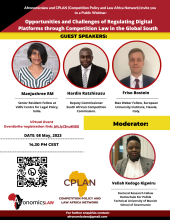Africa and the (Mis-)Promise of Green Finance
This post critiques the extent to which the present green finance rush embraces laws and policies that are largely externally motivated prescriptions designed, mandated, or foisted on resource-rich African countries through creative channels of geopolitical norm diffusion. These contradictions need to be questioned to avoid the charge of greenwashing.
